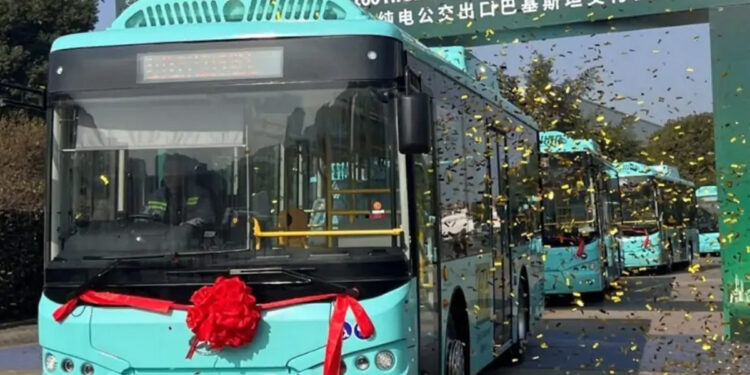RAWALPINDI – In a groundbreaking move to revolutionize urban mobility and promote sustainability, Rawalpindi is set to introduce 102 electric buses that will span an 84-kilometre area across the city. This eco-friendly initiative, led by the Punjab government, is aimed at providing cleaner, greener, and more efficient transportation options to residents, significantly improving the city’s public transit system.
Key Features of the Rawalpindi Electric Bus Service
The new electric bus service will operate on four key routes, designed to connect prominent areas and make travel more convenient for commuters:
- Route 1: Islamabad International Airport to Railway Station
Key stops: GT Road, Kohinoor Mill, Race Course. - Route 2: Railway Station to Chaklala Scheme Three
Key stops: Saddar, Kacheri. - Route 3: T-Chowk to Kacheri Chowk
Key stops: DHA Phase Five, Bahria Phase Seven, Ayub Park. - Route 4: Adiala Jail to Metro Station Saddar
Key stops: Lal Kurti, Khawaja Corporation.
These routes have been carefully planned to cover key residential and commercial areas of the city, ensuring seamless connectivity for both residents and visitors.
Project Investment and Timeline
The estimated cost of the electric bus project exceeds Rs7 billion, with the Punjab government contributing Rs4.7 billion towards its implementation. The initiative is being executed by the Punjab Mass Transit Authority (PMTA), with an ambitious completion timeline set for November 30, 2025.
As part of a broader vision, a total of 200 electric buses are planned for deployment across various city routes, including areas within the cantonment.
Infrastructure Upgrades to Support the Electric Bus Service
To ensure smooth operations of the new electric buses, the project also includes major upgrades to Rawalpindi’s transportation infrastructure:
- Chohar Chowk Depot: The old GTS bus depot will undergo renovations to accommodate up to 100 electric buses.
- Adamjee Road Terminal: A state-of-the-art terminal will be built, featuring 40 electric charging stations to power the new buses.
Collaboration with China and Environmental Goals
This initiative aligns with a significant agreement signed during Prime Minister Shehbaz Sharif’s recent visit to China, focusing on curbing environmental pollution and promoting sustainable public transport solutions. The partnership reflects a growing global commitment to reducing carbon footprints and fostering greener cities.
The Chief Minister Maryam Nawaz has also fully supported the project, emphasizing the importance of developing a modern transport system in Rawalpindi. This project marks a crucial step towards reducing the city’s environmental impact and modernizing public transport infrastructure.
A Greener Future for Rawalpindi
The introduction of electric buses in Rawalpindi represents a major milestone in the city’s efforts to reduce carbon emissions and promote eco-friendly alternatives. These buses will not only enhance the efficiency and accessibility of public transport but also significantly contribute to improving air quality and reducing noise pollution.
For commuters, these modern electric buses promise a smoother, more comfortable ride. Additionally, the initiative is expected to reduce the city’s dependence on fossil fuels, providing long-term environmental benefits.
Looking Ahead: Expansion Plans
As part of its sustainable urban development strategy, the Punjab government has already laid out plans to expand the electric bus fleet further, gradually covering more areas of Rawalpindi and potentially extending to neighboring cities.
Conclusion
Rawalpindi’s new electric bus service is set to transform the city’s public transport system, offering a greener, more efficient alternative for commuters while contributing to a cleaner, healthier environment. With its eco-friendly buses, modernized infrastructure, and collaboration with China, Rawalpindi is poised to become a leader in sustainable urban mobility in Pakistan. This initiative will not only serve the needs of today’s commuters but will also help build a more sustainable future for generations to come.









